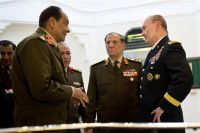ABOARD A MILITARY AIRCRAFT, Feb. 12, 2012 — The chairman of the Joint Chiefs of Staff said he voiced both concerns and commitment to Egyptian defense leaders during meetings held yesterday in Cairo.
Army Gen. Martin E. Dempsey met with his Egyptian counterpart, Lt. Gen. Sami Hafez Enan, as well as with Field Marshal Mohamed Hussein Tantawi and other officials at Egypt’s Ministry of Defense. They discussed the long-term relationship between the U.S. and Egypt and several of that nation’s regional issues. They also addressed Egypt’s investigation of allegedly illegal foreign funding for pro-democracy nongovernmental organizations by more than 40 Egyptian and American activists, including 19 U.S. citizens.
Several Americans who are targets of the investigation have not been allowed to leave Egypt and have taken refuge at the U.S. Embassy in Cairo. Dempsey’s trip was planned long before this situation developed and caused tension between the two nations.
“We discussed that [situation] very professionally,” the chairman told American Forces Press Service during the flight back. “I expressed the fact that it caused us concern, not only about the particular NGOs and individuals currently unable to leave the country, but rather more broadly.”
Dempsey said he asked the defense leaders, “ ‘What signal should I take from this in terms of how you see Egypt’s future? Are you going to become isolated? Are you going to preserve individual freedoms or deny them?’ ” He noted that “they don’t have the answers right now.”
Along with his concern, the chairman expressed the Defense Department’s commitment to common interests, choices and consequences.
Dempsey, who happened to visit Cairo on the Feb. 11 anniversary of the overthrow of former President Hosni Mubarak, said that although Egypt has always had a military president, the country “has never been a democracy of the sort they’re trying to develop now.”
The chairman added, “Frankly they’re struggling — I think [that] is probably a fair term — to figure this all out, to follow the timeline for the different elections, the framing of the constitution and eventually the presidential elections in June.”
Dempsey said he found the Egyptian military “quite eager” to get out of the country-running business.
The chairman has had five-year relationship with Enan and Tantawi that began in 2007 when Dempsey was deputy commander of U.S. Central Command, and that continued after he became acting commander in 2008.
On the foundation of that relationship, Dempsey said, he went into what might have been a tough meeting and was able to be candid.
“But we’ve got some work to do” on resolving tensions related to the NGO issue, he added, “and so do they.”
The military leaders also discussed joint exercises like Bright Star, a biennial, multi-national exercise designed to strengthen military-to-military relationships and improve readiness and interoperability between U.S., Egyptian and coalition forces.
“We of course postponed it in [20]11 because [the Egyptian military leaders] were rather busy,” Dempsey said, adding, “We’re both eager to pick it up again in [20]13. But there are some issues that have to be resolved soon in order to do that.”
During a year filled with monumental changes for the government, citizens and military forces of Egypt, the army has become inwardly focused on such new responsibilities as internal security, the chairman said.
“I think they’ve adapted to that pretty well,” Dempsey said, and attributed the country’s ability “to promote a process toward democracy — notice I didn’t say they’re there yet — because of our relationship with them.”
At any given time, he added, “200 to 300 of their officers are in our schools, and I think that we should take some sense of satisfaction that they have done that.”
Dempsey said the U.S. military will continue to remain engaged with Egyptian leaders as they work through the changes that lie ahead.
“In June they’ll salute a civilian president for the first time … and then they’ll go back to barracks. But I don’t think it’s going to be as clean as that.”
Contending with being subordinate to a civilian authority won’t be easy, the chairman said, but today “they’re all saying the right things, and I believe they all intend the right things.”
The true test, he added, will be the remaining elections, the framing of the constitution and the June presidential elections.
“That’s why we want to stay engaged with them … not [to] shape or influence, but simply be there as a partner to help them understand their new responsibilities,” Dempsey said.
“I think they eager to have that kind of partnership with us,” he added, “but we have to get beyond this NGO issue.”
Source:
U.S. Department of Defense
Office of the Assistant Secretary of Defense (Public Affairs)

 von
von 